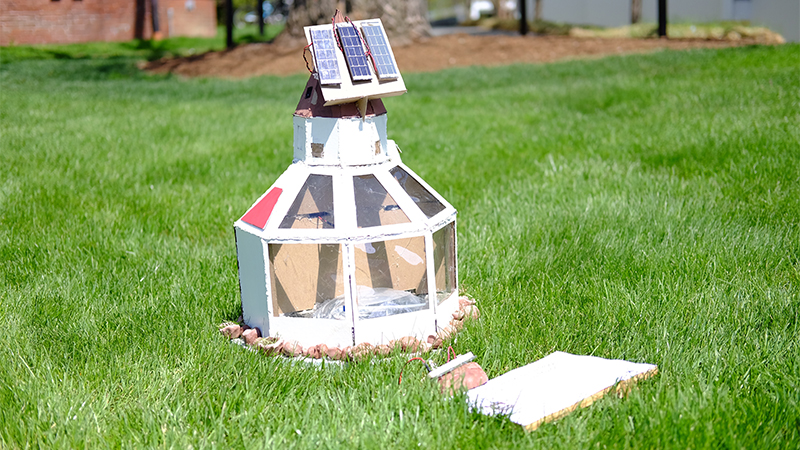Courses

Smith College Engineering Courses
EGR 100 Engineering for Everyone
EGR 110 Fundamental Engineering Principles
EGR 220 Engineering Circuit Theory
With EGR 220L
EGR 220L Circuit Theory Laboratory
EGR 270 Engineering Mechanics
With EGR 270L
EGR 270L Engineering Mechanics Laboratory
EGR 290 Engineering Thermodynamics
EGR 374 Fluid Mechanics
With EGR 374L
EGR 374L Fluid Mechanics Laboratory
EGR 410D Engineering Design and Professional Practice
EGR 421D Capstone Design with Faculty
See Capstone Design with Faculty
EGR 422D Capstone Design with Industry: Design Clinic
See Capstone Design with Industry: Design Clinic
EGR 312 Seminar: Atmospheric Processes
EGR 314 Seminar: Contaminants in Aquatic Systems
EGR 315 Seminar: Ecohydrology
EGR 320 Signals and Systems
EGR 322 Seminar: Acoustics
EGR 323 Seminar: Introduction to Microelectromechanical Systems (MEMS)
EGR 325 Seminar: Electric Power Systems
EGR 326 Dynamic Systems & Introduction to Control Theory
EGR 328 Seminar: Wireless Sensor Networks
EGR 340 Seminar: Geotechnical Engineering
EGR 346 Hydrosystems Engineering
EGR 350 Seminar: Engineering and Cancer
EGR 351 Seminar: Introduction to Biomedical Engineering
EGR 360 Seminar: Advanced Thermodynamics
EGR 363 Mass and Heat Transfer
EGR 372 Seminar: Advanced Solid Mechanics and Failure Analysis
EGR 373 Seminar: Skeletal Biomechanics
EGR 375 Strength of Materials
EGR 377 Seminar: Aerial Vehicle Design
EGR 388 Seminar: Photovoltaic and Fuel Cell System Design
EGR 389 Seminar: Techniques for Modeling Engineering Processes
EGR 390 Advanced Topics in Engineering
- Coastal Contaminants
- Contaminant Fate and Removal in Aquatic Systems
- Intro to Microelectronics
- Material Science
EGR 400 Special Studies
Special studies is a self-designed course with faculty oversight. Upper-level students interested in registering for a special studies course should develop a proposal in consultation with a faculty member who has agreed to supervise the project.
Technical Depth Credit
Special studies requires formal approval to be substituted for course work as a student's technical depth credit. No more than 4 credits of special studies may count toward the technical depth requirement. It is important to obtain the approval for technical depth credits before the add/drop period of the semester.
To allow special studies to count toward technical depth credit, you must:
- Submit a departmental supplement form (see Forms) with a short description of the project. Identify on this form that you want technical depth credit for the course. This description must have the objectives for the special studies identified and mapped against two or three relevant ABET outcomes. To do this one would work with the faculty member sponsoring the special studies and identify the deliverables (evidence) for achieving these outcomes.
- Meet with your faculty adviser to discuss and document how your special studies work helps you achieve your educational objectives. In the documenting of this you will want to give your adviser some signed record regarding how your special studies enables you to meet your educational objective in a manner that cannot be achieved via the course work available to you.
- Obtain the approval of your adviser and the director of your special studies work, and submit these approvals on the Departmental Supplement form to the assistant director. The request will be taken to the faculty for approval at the earliest possible time in the semester.
Capstone Design
EGR 422 Design Clinic is a two-semester course in which students collaborate in teams on applied design projects sponsored by industry and government.
See the majors page for information about capstone design pathways and courses for prequesites and core courses. Additional details about the Design Clinic course, projects and sponsors can be found on the Design Clinic website.
In EGR 421D Capstone Design with Faculty, students work on a design project sponsored by an individual member of the engineering faculty. See requirements for the major and courses for more information, including prerequisites and core courses.
Examples of theses include the following titles:
- Design of a Portable Data Acquisition System to Measure Sound Exposure from MP3 Headphones
- A Network Model for Auditory-System Changes to Increases in Intracranial Pressure
- Design and Analysis of Hybrid Power System Options for Off Grid Rural Electrification in Northern Kenya
- Rural Electrification in South Africa – Design Challenges, Considerations and Choices
- Consumer Interface for Real-Time Electrical Demand
Design Your Program
The Picker Engineering Program allows you flexibility in selecting courses on campus or elsewhere, including studying abroad. Consult the following resources for some guidelines.
